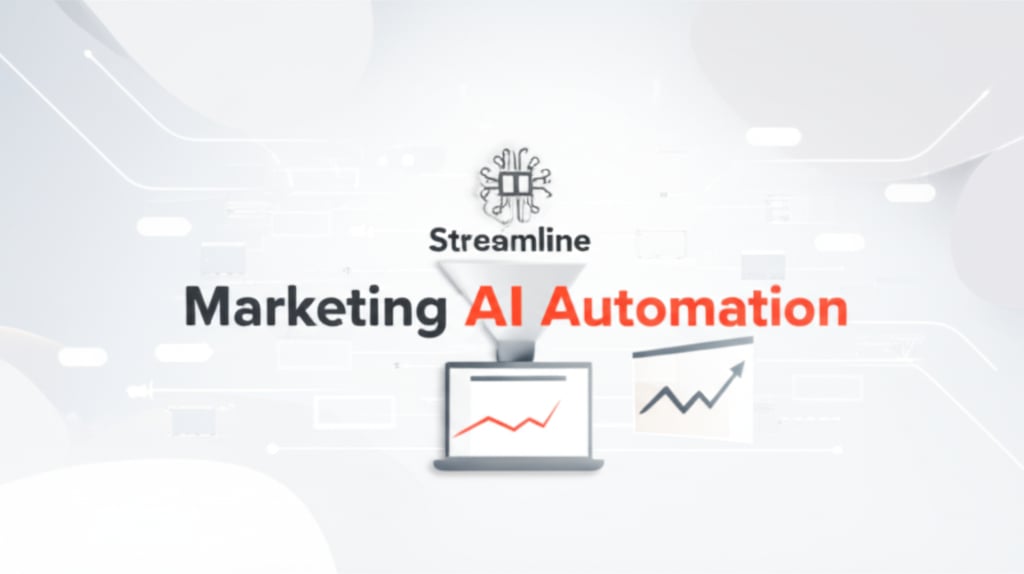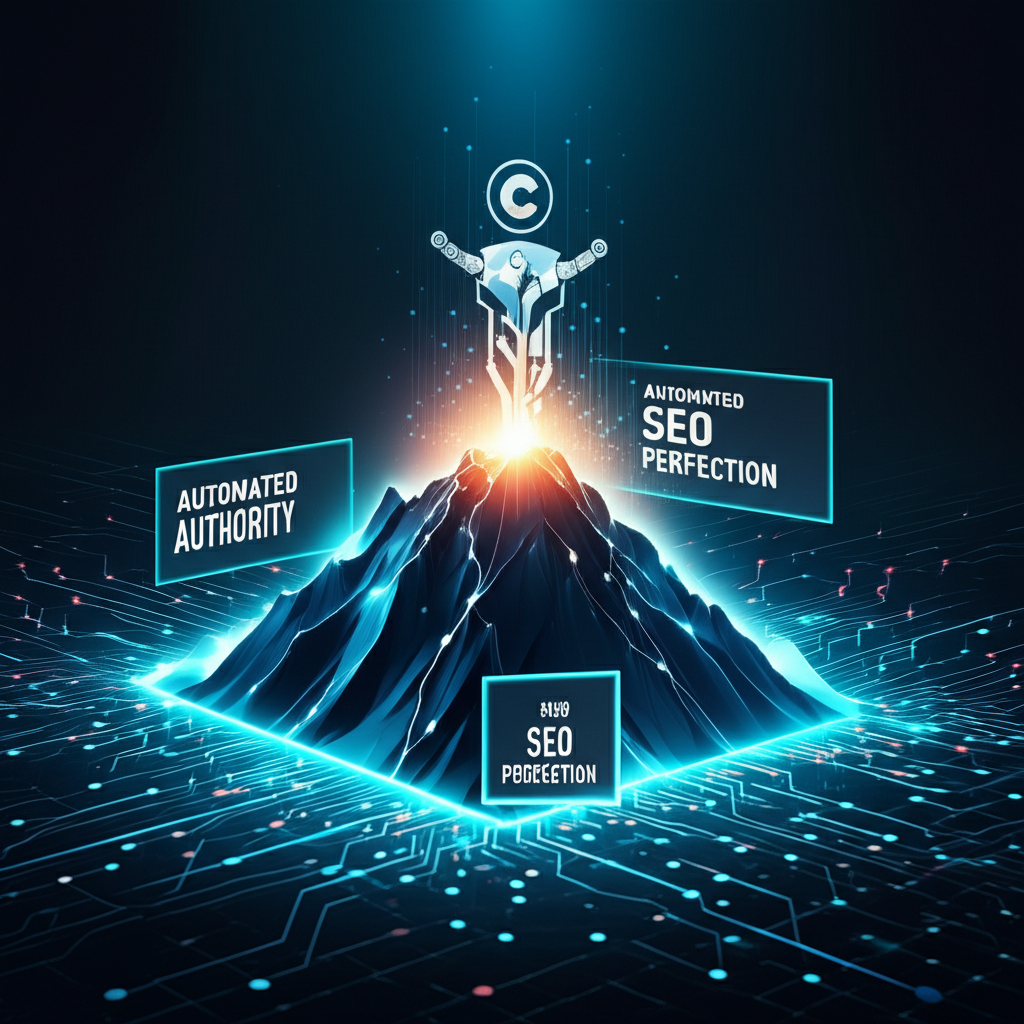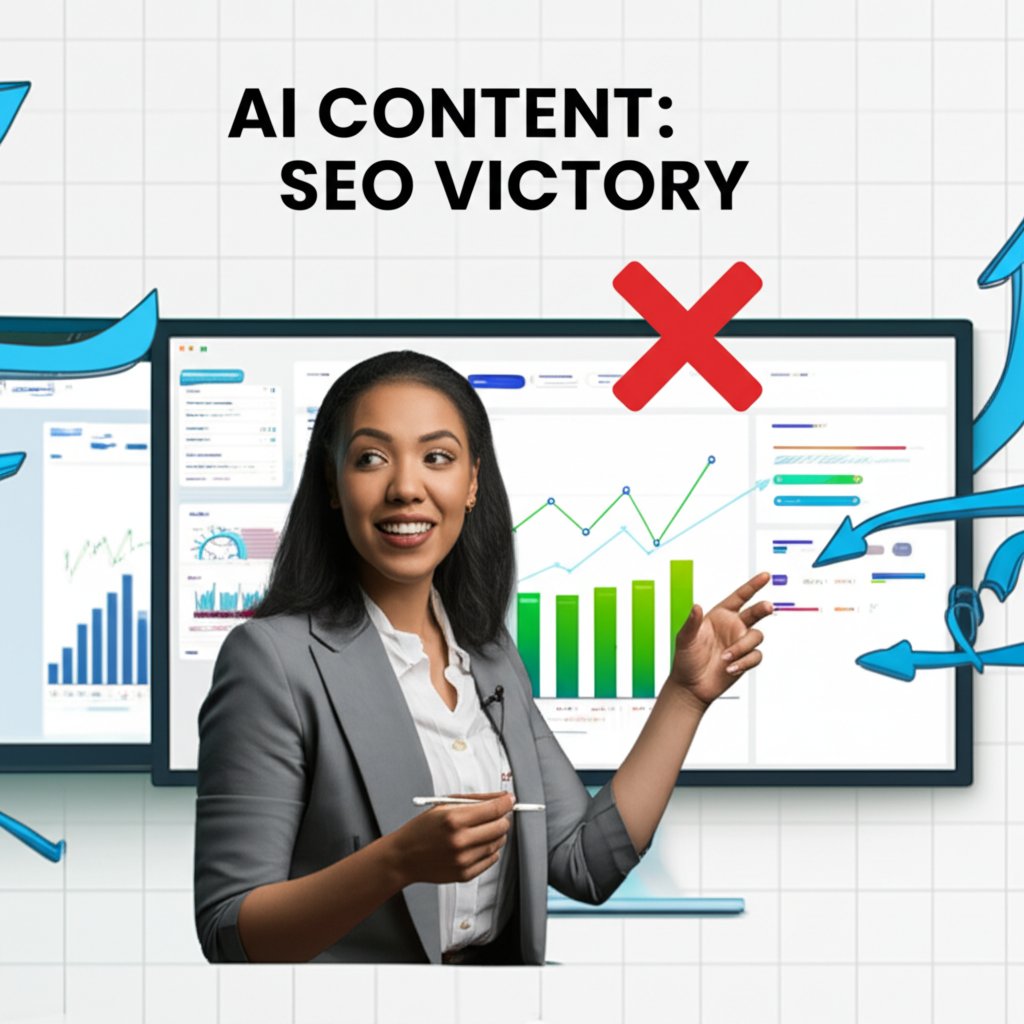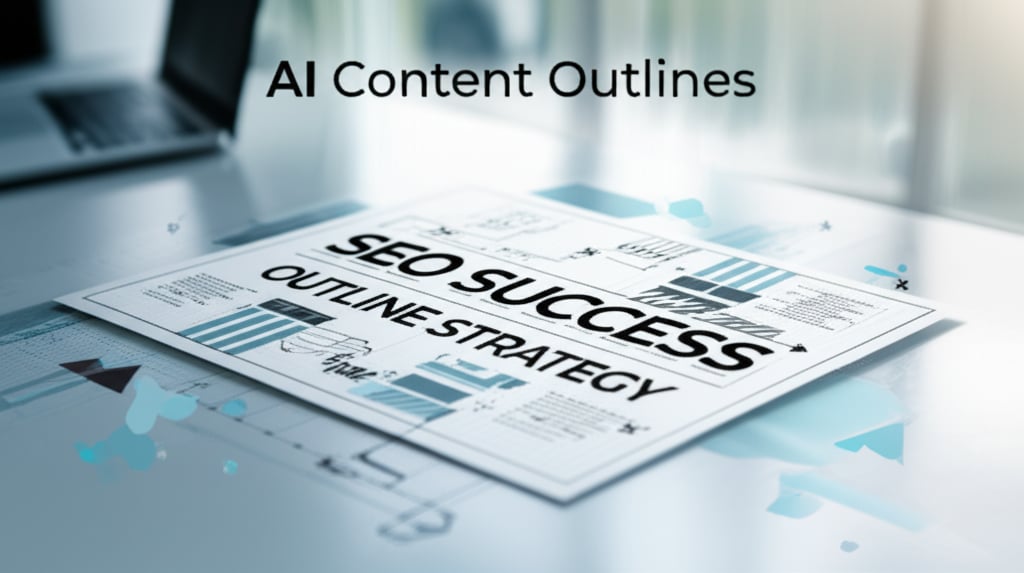Streamline Marketing: AI Automation for Lean Teams

Enhance Your Marketing: AI Automation for Agile Teams
Uncover how AI automation empowers lean marketing teams to dramatically accelerate growth, fine-tune campaigns, and establish market dominance without expanding your workforce. This comprehensive guide provides practical strategies and keen insights into harnessing AI for unparalleled efficiency and commanding market presence.
TL;DR: AI Automation for Agile Teams
- AI transforms nimble marketing teams by automating repetitive tasks and significantly boosting overall efficiency.
- Leverage AI for highly personalized engagement, precise data-driven decisions, and scalable content generation.
- Strategic AI integration enables market leadership and fosters substantial, measurable business expansion.
Key Takeaway: AI automation grants agile teams a powerful trifecta: superior efficiency, deep personalization, and strategic market expansion.
The Imperative: Why Agile Teams Must Embrace AI Automation

Lean marketing teams operate under intense pressure: ambitious growth targets, constrained resources, and an ever-evolving digital landscape. Relying on traditional manual methods inevitably stifles progress, consumes precious time, and diverts focus from strategic objectives. The clear mandate is to revolutionize operations with advanced solutions that yield scalable results without ballooning operational costs.
Artificial Intelligence (AI) automation is no longer an optional enhancement; it's a fundamental strategic necessity. Projections indicate that global AI marketing revenue will surpass an impressive US$107.5 billion by 2028, with nearly 70% of marketers already integrating AI into their workflows. This decisive shift allows teams to overcome traditional operational barriers, transforming resource limitations into an unmatched competitive edge. Embrace AI to accelerate your journey toward market leadership.
Value: AI as Your Strategic Multiplier
AI functions as a formidable force multiplier for lean teams, dramatically elevating both efficiency and output. It intelligently automates monotonous, time-intensive tasks, thereby liberating human talent to concentrate on high-value strategic initiatives. This paradigm shift enables smaller teams to achieve impact typically associated with larger enterprises, facilitating data-driven decisions at speeds previously unattainable. AI empowers agile operations to optimize every facet of marketing, from dynamic content creation to sophisticated campaign management, ensuring sustainable growth and robust market penetration.
Steps to Pinpoint Automation Opportunities
- Systematically Review Workflows: Document all marketing tasks, noting time expenditure and resource allocation. Identify persistent bottlenecks and highly repetitive manual processes, such as routine social media scheduling, initial content drafting, or basic data aggregation.
- Quantify Manual Labor Drains: Precisely determine where the bulk of manual effort is concentrated. Tasks like content generation, lead qualification, and performance reporting frequently consume significant hours. Industry sources highlight content creation as a leading time sink for social marketers.
- Prioritize High-Impact Automation: Focus on automating tasks that promise the most substantial time savings or directly influence key performance indicators (KPIs). Initiate with one or two areas where AI can deliver tangible results within 30-60 days to build momentum and demonstrate value.
- Assess Tool Compatibility: Before introducing new AI solutions, evaluate your existing technology stack (CRM, content calendar, analytics). Prioritize AI tools that seamlessly integrate to prevent data silos and avoid unnecessary operational complexity.
Key Takeaway: AI automation serves as the strategic lever for agile teams to transcend resource constraints and accelerate market impact by offloading manual, repetitive tasks.
Unlocking Strategic Advantage with AI-Powered Marketing
AI-powered marketing transcends mere basic automation; it fundamentally redefines how brands engage with their audience. This advanced intelligence facilitates hyper-personalization, pinpoint targeting, and predictive analytics—capabilities once exclusively available to large, well-funded organizations. Agile teams can now deploy sophisticated strategies with unparalleled dexterity, converting raw data into actionable insights and solidifying their competitive position.
Leveraging AI means more than simply executing tasks faster; it signifies a smarter approach. AI models analyze vast datasets to anticipate customer behavior, pinpoint high-value leads, and optimize content delivery in real-time. This dynamic adaptation ensures that every marketing touchpoint is relevant, timely, and impactful, directly contributing to superior conversion rates and enhanced customer loyalty. The strategic edge lies in the ability to foresee market shifts and respond proactively, securing an unassailable position.
Value: Predictive Power and Tailored Engagement
AI offers profound predictive power and enables truly personalized engagement at an expansive scale. By meticulously analyzing customer interactions and preferences, AI crafts hyper-relevant messages and bespoke experiences. This capability is paramount: a remarkable 91% of consumers actively prefer brands that personalize, and AI has been shown to drive a 35% increase in purchase frequency. Beyond personalization, AI-powered decision-making elevates forecasting accuracy by 47%, leading to more intelligent budget allocation and campaign planning. These deep insights empower agile teams to act with precision, ensuring every marketing investment yields maximum return.
Steps to Maximize AI for Market Intelligence
- Implement Predictive Analytics Tools: Adopt platforms that utilize machine learning to forecast customer behaviors, identify potential churn risks, and estimate customer lifetime value. Integrate these tools with your existing customer relationship management (CRM) systems to enrich profiles and inform precise, targeted strategies.
- Develop Hyper-Personalization Frameworks: Employ AI to generate dynamically adaptable content and messaging. Tailor communications based on real-time user behavior, browsing patterns, and engagement metrics across all channels, from email to social media feeds.
- Leverage Sentiment Analysis for Brand Health: Deploy AI-driven social listening and sentiment analysis tools. Monitor brand mentions, track emerging trends, and decipher the emotional context embedded within customer feedback. This provides instantaneous insights into brand perception and novel market opportunities.
- Integrate Real-time Feedback Loops: Establish systems that provide immediate performance insights for ongoing campaigns. Utilize AI to test and dynamically adjust creative assets, messaging, or targeting parameters on the fly, optimizing outcomes without needing to restart the entire campaign cycle.
Key Takeaway: AI furnishes agile teams with predictive intelligence and hyper-personalization capabilities, transforming raw data into strategic advantages for market leadership and superior customer experiences.
Core Pillars of AI Marketing Automation for Efficiency
Efficient marketing automation is built upon powerful AI technologies that fundamentally redefine operational capabilities. Machine learning, natural language processing, and generative AI form the essential foundation of a streamlined marketing ecosystem. These technologies are indispensable for lean teams aiming to maximize output while minimizing manual intervention, thereby driving strategic growth through intelligent, automated processes.
These core pillars facilitate automated content creation, intelligent predictive targeting, and dynamic campaign orchestration. They propel marketing beyond mere reactive responses towards proactive, data-informed strategies. The seamless integration of these AI capabilities transforms disjointed tasks into a cohesive, high-performance workflow, ensuring consistent brand messaging and optimized reach across all digital channels.
Value: Automating Content, Personalizing at Scale
AI's foundational technologies automate content generation and enable personalization on an unprecedented scale. Generative AI allows for the rapid production of high-quality, on-brand content—ranging from blog posts to social media updates—significantly alleviating the burden on creative teams. This capability is further amplified by Natural Language Processing (NLP), which understands and adapts content based on audience sentiment and preferences. Subsequently, Machine Learning optimizes content delivery, ensuring messages deeply resonate and drive conversions. This powerful synergy empowers agile teams to maintain an authoritative digital presence and effectively engage diverse audiences.
In the realm of content, an advanced platform, such as OutBlogs, functions as a potent growth flywheel, automating the entire content lifecycle from strategic conceptualization to final publication. It is specifically engineered to generate and rank high-quality, SEO-optimized blog content, helping businesses secure top search engine positions with minimal manual effort. This proprietary system ensures a powerful combination of Automated Authority and SEO Perfection.
Steps to Integrate Core AI Technologies
- Adopt Generative AI for Content Production: Integrate AI tools specifically designed for generating diverse content formats (text, image, video, audio). Utilize them for drafting articles, crafting engaging social captions, and repurposing extensive content into concise pieces suitable for various platforms.
- Leverage NLP for Audience Insights: Implement NLP-driven tools to analyze customer feedback, understand underlying sentiments, and identify distinct linguistic patterns. This intelligence informs more nuanced and effective messaging strategies and enhances customer service interactions.
- Deploy Machine Learning for Optimization: Utilize ML algorithms for sophisticated lead scoring, proactive churn prevention, and comprehensive campaign optimization. Allow these systems to learn from historical performance, automatically adjusting bidding strategies or content delivery times for maximum impact.
- Embrace Autonomous AI Workflows: Explore platforms that employ AI agents for end-to-end campaign management. These intelligent collaborators can autonomously plan, execute, and learn, from optimizing omnichannel advertising to real-time content tailoring.
Key Takeaway: Machine learning, NLP, and generative AI are indispensable for automating content creation, enhancing personalization, and optimizing campaign performance, driving efficiency and scalability for lean marketing teams. This strategic edge is precisely what innovative platforms like Dubit Live aim to provide, transforming marketing capabilities for the modern business landscape.
Implementing AI Automation: A Strategic Roadmap
Successful AI automation mandates a clear, systematically structured implementation roadmap. Without a strategic framework, even the most powerful AI tools can lead to fragmented efforts and suboptimal outcomes. Agile teams must prioritize meticulous planning, seamless data integration, and continuous refinement to truly harness AI's transformative potential and ensure a smooth transition to automated workflows.
This roadmap outlines a framework for integrating AI capabilities across your entire marketing operation, from initial assessment to ongoing optimization. It underscores the critical importance of a unified data foundation, ethical considerations, and cultivating an AI-ready organizational culture. By adhering to a methodical implementation strategy, teams can unlock sustainable growth, enhance decision-making agility, and secure a significant competitive advantage.
Value: Phased Adoption for Optimal ROI
A phased adoption strategy guarantees maximum return on investment (ROI) while minimizing operational disruption. Begin by thoroughly assessing your specific marketing automation needs, identifying existing gaps, and pinpointing AI capabilities that offer the most immediate value. Data integration and management are paramount: a unified data foundation is crucial for achieving a single customer view, which is essential for effective personalized marketing. Companies that strategically invest in data quality and integration report an average 25% increase in ROI from their marketing initiatives. This methodical approach empowers teams to learn, adapt, and scale AI integration effectively and sustainably.
Steps for a Successful AI Implementation Roadmap
- Conduct a Thorough Needs Assessment: Evaluate your current technology infrastructure, team competencies, and existing marketing processes to pinpoint immediate opportunities for AI integration. Prioritize areas that promise quick wins and substantial efficiency gains.
- Action: Compile an inventory of all current tools and operational processes.
- Action: Survey team members to identify time-consuming tasks and critical bottlenecks.
- Establish a Robust Data Ecosystem: Prioritize data quality, seamless integration, and stringent governance. Consolidate data from CRM, analytics platforms, and social media channels to forge a unified customer view, ensuring both accuracy and adherence to privacy regulations like GDPR.
- Action: Perform a comprehensive data audit to identify sources and ensure consistency.
- Action: Implement robust data integration tools (e.g., APIs, ETL processes) to connect disparate systems.
- Pilot Small, High-Impact Solutions: Initiate with a pilot project focused on automating one or two high-value, repetitive tasks. Measure tangible results, such as hours saved or increased engagement, within 30-60 days to clearly demonstrate ROI and build internal consensus.
- Action: Select a specific AI tool for a defined task, such as AI-powered content drafting or automated social media scheduling.
- Action: Define clear and measurable success metrics before launching the pilot.
- Upskill Your Team and Foster an AI-Ready Culture: Invest in targeted training programs to cultivate skills in AI literacy, prompt engineering, and advanced data analysis. Encourage a culture of experimentation and collaborative engagement with AI, reframing it as an indispensable co-pilot rather than a replacement.
- Action: Provide access to specialized AI training resources and interactive workshops.
- Action: Promote cross-functional collaboration between marketing and IT/data science teams.
- Scale and Refine Incrementally: Based on successful pilot outcomes, gradually expand AI integration into other marketing functions. Continuously monitor performance, refine strategies, and adjust AI models to ensure optimal results and responsiveness to evolving market demands.
- Action: Regularly review AI-generated performance reports and insights.
- Action: Conduct A/B tests on various calls-to-action (CTAs) and content variations to boost conversions.
Key Takeaway: A strategic, phased roadmap—emphasizing needs assessment, data integrity, pilot projects, team upskilling, and incremental scaling—is paramount for successful AI automation and maximizing its ROI.
Beyond Efficiency: Achieving Unrivaled Market Domination

AI automation extends far beyond mere operational efficiency; it is a powerful catalyst for achieving market domination. For agile teams, this translates into not just keeping pace, but aggressively outmaneuvering larger competitors. By leveraging AI to craft, optimize, and disseminate content with unparalleled speed and precision, you transform your marketing from a perceived cost center into a potent engine for sustained growth and undeniable industry authority.
Unrivaled market domination is forged through consistent visibility, profound customer comprehension, and agile execution. AI empowers lean teams to excel in all three dimensions. From predictive lead scoring that precisely identifies your most valuable prospects to hyper-personalized campaigns that convert at elevated rates, AI ensures every marketing action is optimized for maximum impact. This strategic leverage allows you to establish a dominant presence, capture significant market share, and cultivate an enduring competitive advantage.
Value: Establishing Automated Authority and SEO Perfection
AI enables lean teams to establish Automated Authority and attain SEO Perfection, both critical components of market domination. By generating expert-level articles and meticulously optimizing every element—including headings, internal links, and images—for search engines, AI platforms ensure content consistently achieves top rankings. This eliminates the laborious manual checklists and provides a proprietary system for an "unfair advantage" in content creation and distribution, encompassing aspects like Generative Engine Optimization (GEO). The result is a continuous stream of high-quality, conversion-focused content that firmly positions your brand as a leading voice and drives robust organic traffic.
Steps to Dominate Your Niche with AI
- Calibrate Your Content Engine: Connect your existing content assets to an AI platform. Allow it to learn your unique brand voice, analyze competitor strategies, and identify high-value keywords pertinent to your niche. This foundational step is crucial for establishing AI-driven content authority.
- Action: Upload current articles, comprehensive branding guidelines, and competitor analyses.
- Action: Clearly define core target keywords and detailed audience personas.
- Deploy a Data-Driven Content Strategy: Utilize AI to generate a comprehensive 30-day content plan meticulously designed to capture top-ranking keywords. Focus on establishing an automated pipeline for blog posts, social media updates, and website copy, ensuring consistent production and optimal SEO.
- Action: Approve AI-generated content briefs and detailed outlines.
- Action: Schedule content for automated publishing across various platforms.
- Amplify with Multimedia and Global Reach: Integrate AI-generated multimedia elements (images, video, audio) to significantly enhance content engagement. Leverage AI for instant translation and localization into over 100 languages, thereby expanding your market reach and global authority without necessitating additional headcount.
- Action: Utilize AI to suggest and embed relevant videos or generate image prompts.
- Action: Explore AI translation services for key content assets to reach diverse audiences.
- Monitor, Optimize, and Convert Continuously: Deploy AI-powered analytics to continuously monitor content performance, track keyword rankings, and measure conversion rates in real-time. Use these dynamic insights to continually refine your content strategy and optimize calls-to-action (CTAs) for maximum business results.
- Action: Regularly review AI-generated performance reports and conversion data.
- Action: A/B test different CTAs and content variations to boost conversion rates and engagement.
Key Takeaway: Achieving market domination necessitates leveraging AI for automated authority, SEO perfection, and expansive global reach, transforming lean teams into high-performance marketing powerhouses.
The Future is Automated: Empowering Your Marketing Evolution
The trajectory of marketing is undeniably automated, demanding a fundamental evolution in how teams operate and how skills are developed. AI is not merely a tool; it functions as a strategic partner that reshapes professional roles, elevates organizational capabilities, and empowers agile teams to attain unprecedented levels of productivity and innovation. Embracing this evolution ensures sustained growth and secures your position at the vanguard of the digital landscape.
This transformative shift redefines marketing roles into dynamic hybrid functions, where human expertise synergizes with algorithmic intelligence. Marketers will transition from repetitive execution to strategic oversight, focusing on guiding AI, interpreting its outputs, and preserving the crucial human elements of brand voice and empathy. This collaborative future promises accelerated testing cycles, deeper actionable insights, and more impactful campaigns, converting the challenges of limited resources into unparalleled strategic advantages.
Value: Cultivating an AI-Ready Marketing Organization
Cultivating an AI-ready marketing organization is paramount for future success. This involves developing innovative team structures, strategically upskilling talent, and fostering a pervasive data-driven culture. A significant 70% of marketing leaders anticipate AI will profoundly impact their roles within the next two years. Lean teams must prioritize training in AI literacy, effective prompt engineering, and advanced data analysis. The overarching goal is to build a collaborative environment where marketers leverage AI as a capable co-pilot, concentrating on overarching strategy, meticulous refinement, and maintaining authentic human connection. This proactive approach ensures your team not only adapts to change but thrives within it, driving continuous innovation and securing market leadership.
Steps to Build an AI-Ready Marketing Team
- Invest in AI Literacy and Skill Development: Provide continuous training in AI tools, effective prompt engineering, data interpretation, and ethical AI usage. Focus on cultivating hybrid skills that seamlessly combine core marketing expertise with crucial technological proficiency.
- Action: Offer internal workshops or external courses specifically on AI marketing tools and applications.
- Action: Actively encourage experimentation with new AI functionalities and features.
- Redefine Roles for Human-AI Collaboration: Strategically shift team responsibilities from manual task execution to overarching strategic guidance, meticulous quality assurance, and creative ideation. Emphasize and develop unique human attributes such as empathy, critical thinking, and nuanced brand storytelling.
- Action: Create entirely new roles or thoughtfully adapt existing ones to incorporate AI oversight and management.
- Action: Prioritize developing skills in strategic foresight and creative problem-solving.
- Foster a Culture of Continuous Experimentation: Actively encourage an agile mindset characterized by rapid testing and iterative improvement. Promote a secure environment that supports exploring novel AI applications and learning valuable lessons from both successes and failures.
- Action: Implement A/B testing as a standard operational practice for all AI-generated content and campaigns.
- Action: Establish clear and efficient feedback loops for all AI outputs and processes.
- Prioritize Ethical AI Governance: Implement explicit guidelines for data privacy, proactive bias detection, and unwavering transparency in AI deployment. Regularly audit AI systems to ensure fairness, accuracy, and full compliance with evolving regulations, thereby building deep trust with your audience.
- Action: Develop a comprehensive internal policy specifically for AI use within marketing operations.
- Action: Schedule regular, systematic reviews of AI-driven marketing campaigns for ethical compliance and alignment with brand values.
Key Takeaway: Empowering your marketing evolution means cultivating an AI-ready organization through continuous upskilling, redefining roles for synergistic human-AI collaboration, fostering a culture of experimentation, and upholding strict ethical AI governance.
Driving Action: Your Next Steps for AI-Powered Growth
Embracing AI automation is not a singular project; it represents an ongoing journey toward optimized growth and definitive market dominance. For agile teams, the immediate next steps involve translating valuable insights into decisive action, solidifying AI integration across operations, and continuously refining your strategic approach. This proactive stance ensures your marketing remains agile, exceptionally efficient, and remarkably impactful in the dynamic digital landscape.
The path forward is unequivocally clear: leverage AI to unlock unparalleled efficiency, hyper-personalization, and formidable strategic market positioning. By taking concrete steps to implement and meticulously optimize AI across all your marketing functions, you will not only streamline operations but also establish a lasting competitive advantage. This is your prime opportunity to redefine the limits of what's possible for your lean team and accelerate toward sustained business outcomes.
Value: Accelerate Your Growth Trajectory
Accelerating your growth trajectory demands immediate and strategic AI adoption. Begin by meticulously assessing your current marketing infrastructure to identify prime integration points for AI. Explore advanced AI-powered marketing automation tools that precisely align with your specific needs, focusing on features like automated content generation, predictive analytics, and seamless omnichannel orchestration. Develop a comprehensive implementation strategy that includes robust team training and dedicated ongoing support. By prioritizing these crucial actions, you unlock AI’s full potential, driving superior efficiency, enhancing personalization, and securing a commanding market position.
Steps to Action Your AI Strategy
- Conduct an AI Readiness Assessment: Evaluate your current technology stack, existing team capabilities, and present marketing processes to pinpoint immediate opportunities for AI integration. Prioritize areas that offer quick wins and significant efficiency gains.
- Invest in Targeted AI Tools: Select AI-powered marketing automation platforms that directly address your identified needs, such as sophisticated content creation, advanced ad optimization, or intelligent customer journey orchestration. Prioritize tools with robust integration capabilities and a proven track record of success.
- Implement a Pilot Project: Choose a specific, measurable marketing task for initial AI automation. Meticulously document the entire process, rigorously track key performance indicators (KPIs), and gather comprehensive feedback to refine your approach before scaling.
- Establish Continuous Learning Protocols: Create ongoing training and professional development programs for your team to stay abreast of the latest AI advancements. Foster a culture where learning, experimentation, and proactive adaptation are central to your evolving marketing strategy.
- Monitor and Optimize Relentlessly: Utilize AI-driven analytics to continuously track campaign performance, evaluate return on investment (ROI), and identify areas for further optimization. Embrace an iterative refinement process to ensure your AI strategies remain cutting-edge and maximally effective.
FAQ
Why is AI automation crucial for lean marketing teams?
AI automation is indispensable for lean marketing teams as it functions as a powerful force multiplier. It intelligently automates repetitive, time-consuming tasks, thereby freeing up limited human capital for strategic, high-value initiatives. This enables smaller teams to achieve enterprise-level output, make data-driven decisions more rapidly, and scale operations efficiently without the need to increase headcount, ultimately boosting efficiency and deepening market penetration.
What are the primary benefits of AI in marketing beyond efficiency?
Beyond mere efficiency, AI in marketing delivers profound strategic advantages. These encompass hyper-personalization that deeply resonates with individual customers, predictive analytics for anticipating market trends and evolving customer behavior, and the capability to establish 'Automated Authority' through consistently generated, SEO-optimized content. This empowers lean teams to dominate specific niches and sustain a strong, competitive edge.
What core AI technologies are essential for marketing automation?
The essential core AI technologies fundamental for marketing automation include Machine Learning (ML), Natural Language Processing (NLP), and Generative AI. ML algorithms are crucial for optimizing campaigns and predicting behaviors, NLP facilitates understanding and adapting content to audience sentiment, and Generative AI rapidly produces high-quality, branded content across various formats. Collectively, these technologies forge a high-performance, intelligently automated marketing workflow.
How can a lean team effectively implement AI automation?
Effective AI implementation for a lean team necessitates a well-defined strategic roadmap. It should commence with a thorough needs assessment to identify high-impact opportunities, establish a robust data foundation, and then pilot small, high-impact solutions to clearly demonstrate ROI. Crucially, it involves investing in upskilling your team, cultivating an AI-ready culture, and continuously monitoring and refining your AI strategies to ensure sustained success.
How will AI impact existing marketing roles?
AI will fundamentally redefine marketing roles, transforming them into hybrid functions that shift responsibilities from manual execution to strategic oversight. Marketers will evolve into 'co-pilots,' guiding AI, interpreting its outputs, and focusing on inherently human aspects like maintaining brand voice, empathy, and creative ideation. This evolution demands continuous upskilling in AI literacy and prompt engineering, turning potential challenges into opportunities for innovation and leadership.
What ethical considerations should be prioritized with AI marketing?
Prioritizing ethical AI governance is critically important. Marketers must ensure complete transparency in data collection and usage, implement rigorous measures for bias prevention within algorithms, and guarantee the responsible utilization of consumer data in full compliance with regulations such as GDPR. Consistent human oversight and regular audits are essential to uphold fairness, accuracy, and to build enduring trust with the audience, ensuring AI marketing remains profoundly human-centered.


